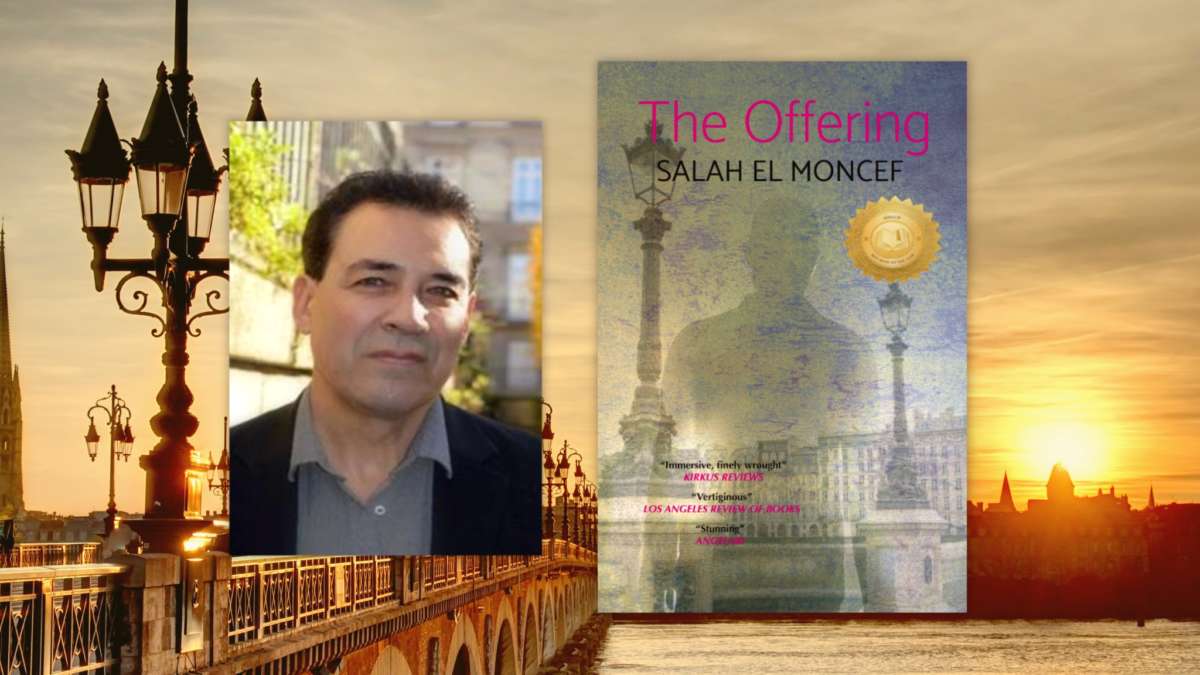The Offering by Saleh el Moncef
“If you choose to seek refuge in the life of the imagination in creative, constructive ways, that unique space within your mind will become your best remedy against life’s trials.”
Those are the inspiring words of Salah el Moncef, whose critically acclaimed novel The Offering explores the nature of loss as the life of a Tunisian diasporic poet, Tariq Abbassi, tragically falls apart.
“This is Tariq’s offering, his gift, what we remember him by,” says el Moncef. “He lost everything — and in the most painful ways, everything except his fertile imagination. He chose to dwell in it, to cultivate it, and the outcome was a book that was a gift for humanity.”
After countless professional disappointments, Tariq flees Tunisia with his wife Regina for a new life in France, where he plans to make it big as an experimental poet. But life in Bordeaux is not as conducive to artistic inspiration as Tariq had hoped, and soon he is struggling just to keep his family together. His uncompromising ambition and untethered anger, however, ultimately lead to an emotional rupture, and Tariq soon finds himself completely alone when Regina takes the children and leaves.
In this recent Q&A, the author gave us further insight into his book, his writing and his themes.
Q: Where did the idea for The Offering come from?
A: The intention behind The Offering was to create a narrator, Tariq Abbassi, who harks back to the days of literary modernism. I wanted an artist-intellectual who is a sort of misfit in our century — alienated in the existentialist sense, evoking Dostoevsky, Kierkegaard, Faulkner and Sartre. I also wanted to craft a style for the novel that would match that type of narrator — a poetic Quentin Compson, if you will. When Penguin Random House contacted me with a potential offer to publish The Offering, that was the first thing they noticed (and liked) about Tariq: the beautifully anachronistic poetry of his style.
Q: The book raises the question: is it possible to hold onto hope when you lose everything else? Tariq suffers many tragedies. Without giving away too much, how would you answer this question — or, if you’d prefer, why did you choose to raise it in the first place?
A: Jeanne Moreau once said — I’m paraphrasing here: “It’s always during our saddest moments that we manage to glimpse our greatest joys.” This is what Tariq’s mother says in the last paragraph of her letter: your destiny is tragic, but don’t you ever forget that the spark of beauty lives on within you, like the spark in the eyes of the owl of your poem.” That’s a key idea in The Offering: no matter how tragic life gets, there is always hope — and the ultimate expression of hope in the book is the human capacity to surmount life’s trials through beauty.
Q: Explain this sentence that describes your work: “There is beauty in everything — even in that which destroys us.”
A: This sentence has actually been misinterpreted. The meaning of my book is that there is always something beautiful enduring beyond the losses life inflicts on every living being. That is the central idea behind the title and the epigraph: What is left after life has consumed Tariq in his attempt to achieve beauty? Is there anything we can remember him by after the destruction? The thing we can remember him by is, of course, the ultimate offering, the gift of his ravishing words — the book miraculously resurrected by the American editor long after the death of its author.
Q: How would you describe your writing style? And tell us a little bit about your writing process — whether you have the story all mapped out in advance or whether you modify as you go along.
A: I like well-crafted poetic prose, and it’s important for me to give my writing a strong visual quality. A lot of critics and readers compare my writing to painting, and they’re right about that — it’s a deliberate choice. As far as the composition process is concerned, I start with a concept, an outline, and the psychological profiles and key motives of the main characters. When I’m done with that, I fiddle around with the outline and the concept in my mind — a lot — till I have an opening and an ending. Once I have those two, they never change, wording and all. In a way, they become the story’s raison d’être, giving me that motivating feeling that the story is now born as a full entity.
Q: What did you find as the most challenging passage to write?
A: There were lots of challenging moments in The Offering, but the scenes of the SWAT team intervention, followed by the CSI team; the searing sequences where Tariq has a vision of himself in the ICU. Those were very tough to write — not only because of their emotional tenor, but also because a delicate balance had to be maintained between narrative flow/spontaneity, emotional depth and flawless precision regarding technical detail. Those moments were very, very hard to write. But they were also greatly appreciated by critics and readers alike.
Q: What do you want readers to take away from this book?
A: No matter how many curveballs life throws your way, you’re always in control of your imagination, your fantasy processes, the flow of your memories. If you choose to seek refuge in the life of the imagination in creative, constructive ways, that unique space within your mind will become your best remedy against life’s trials. This is Tariq’s offering, his gift, what we remember him by. He lost everything — and in the most painful ways, everything except his fertile imagination. He chose to dwell in it, to cultivate it, and the outcome was a book that was a gift for humanity!
 About Salah El Moncef:
About Salah El Moncef:




